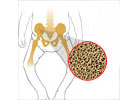
"But so far, not many people have thought about whether or not polyphenols affect nutrient absorption."
The researchers, led by Han, studied the effects of eating grape seed extract and epigallocatechin-3-gallate (EGCG) found in green tea. They used cells from the intestine - where iron absorption takes place - to assess the polyphenols’ effect and found that polyphenols bind to iron in the intestinal cells, forming a non-transportable complex. This iron-polyphenol complex cannot enter the blood stream. Instead, it is excreted in the feces when cells are sloughed off and replaced.
Iron is necessary to carry oxygen from the lungs throughout the body and for other cellular functions. People already at risk for iron deficiency increase that risk if they consume high amounts of grape seed extract or EGCG.
"Iron deficiency is the most prevalent nutrient deficiency in the world, especially in developing countries where meats are not plentiful," said Han.
"People at high risk of developing iron deficiency - such as pregnant women and young children - should be aware of what polyphenols they are consuming."
Advertisement
The result has been published in the Journal of Nutrition.
Advertisement















